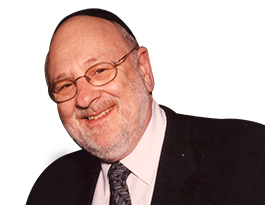
Perhaps this is because of my childhood memories. Back then, at precisely this time of year, my friends and I relished the approach of the end of the school year and the beginning of summer vacation. For us, school was merely a seemingly endless passage toward our longed-for destination, the "lazy, hazy" days of summer.
Or, there might be a much more recent basis to my current preoccupation with transitions and destinations. Since this past Passover, when we celebrated our freedom from slavery, we have counted the days until Matan Torah, the "giving of the Torah," on Shavuos.
Counting aloud each day, day by day and week by week, instilled in me a sense of going through a transition, a passage of seven weeks, leading to an ultimate destination.
That transitions and destinations are part of life is obvious. What is less obvious, but more fascinating, is that one person's destination is often another person's transition, and vice versa.
How well do I remember my first days of employment after my years of graduate school. I experienced those years of toil as a necessary transition to the beginning of my career as a psychologist. My first day at work was the beginning of my destination.
It was on that day that I met a gentleman who was to become a close colleague over the ensuing several years. His name was George Jones, and while I was to be in charge of a small group of school psychologists, he headed a similarly small group of school social workers.
Soon after we first met, we discovered that we had much in common and so no longer confined our conversations to our professional tasks. We discussed our different religions, our family backgrounds, and our hopes and dreams.
We learned much from each other during those conversations. But most of all, we learned just how different our hopes and dreams were. For me, at that time in my life, my role as a trained mental health professional was my destination. It was what I had worked for and what I then anticipated would be my life's work.
For George, on the other hand, his profession was but a transitional role towards his ultimate destination.
Although both of us were exactly 30 years old at the time, his dream was retirement.
Yes, he knew that his destination was 20 or 25 years away, but he spoke about it almost daily, describing the property he bought on the Chesapeake Bay and the boat he would soon be able to afford. The job that was my destination was, for him, but a passage to a different destination entirely.
With this week's Torah portion, Bamidbar (Numbers 1:1-4:20), we begin a new Chumash, the fourth volume of the Pentateuch. Each of the five volumes of the Chumash is unique. My contention is that this fourth volume is unique in the following manner: It begins as a description of a transition, a passage, from the Exodus from Egypt and the revelation at Sinai through a desert wilderness but towards the Promised Land, the land of milk and honey. But it soon becomes apparent that this desert wilderness will become a destination and, for many, a tragically final destination.
This book, which begins as a parade, a joyous and relatively brief journey to the Promised Land, is soon transformed into a book portraying an era of strife, rebellion, war, betrayal, and disillusionment, enduring for nearly forty years!
My private thoughts of transitions and destinations are painfully relevant this year, 5780/2020, the year of the COVID-19 pandemic.
For the past several months, our lives, indeed the lives of the entire human race, have changed drastically.
The question that plagues us, and I deliberately use the word "plagues," is this: are we in a transition that will last for but a relatively brief time, after which we will come to a destination, a "return to normal"? Or have we reached some new destination, a "new normal," that will persist well into the future and that will radically alter every aspect of our existence?
Transition, or destination?
Was it Yogi Berra who said that it is hard to make predictions, especially about the future? Truth to tell, and we must face the truth, it is difficult to think of a moment in history at which there was greater uncertainty than at this moment.
In a certain sense, the distinction between transitions and destinations is an existential one. That is, the question can be asked, "Is our life in this world our final destination, or is it a transition, a prelude, into another world, another mode of existence?"
The answer to this question was proclaimed long ago by the Rabbis of the Mishnah: "Rabbi Jacob said: this world is like an antechamber before the World to Come. Prepare yourself in the antechamber so that you may enter the banquet hall." (Pirkei Avos, 4:21)
Our very lives, according to Rabbi Jacob, are but transitions into another destination, the World to Come. A very sobering teaching, indeed!
But our sages inform us of something even more shocking. Even the World to Come is not a final destination. Even for the righteous, that celestial world is but a passage to a loftier destination.
"Said Rabbi Chiya bar Ashi in the name of Rav: Talmidei Chachamim [pious wise men] have no rest, neither in this world nor in the World to Come, as it is written, 'They will go from strength to strength, and appear before the Almighty in Zion (Psalms 84:80).'" (Talmud, Berakhos 64a).
One is tempted to assume that it is only the righteous who progress ever upward and know no final destination. But surely the wicked, whose destination is Gehenna, have reached "the end of the line."
The Rabbis are quick to assure us, however, that even Gehenna is not the end of the line: "The sentence of the wicked to Gehenna is for but 12 months." (Eduyos 2:10)
Even Gehenna itself is but a transition, hopefully to a higher and nobler destination.
Sign up for the daily JWR update. It's free. Just click here.
(COMMENT BELOW)
Rabbi Tzvi Hersh Weinreb, PhD is currently the Executive Vice President, Emeritus of the Orthodox Union.


 Contact The Editor
Contact The Editor
 Articles By This Author
Articles By This Author